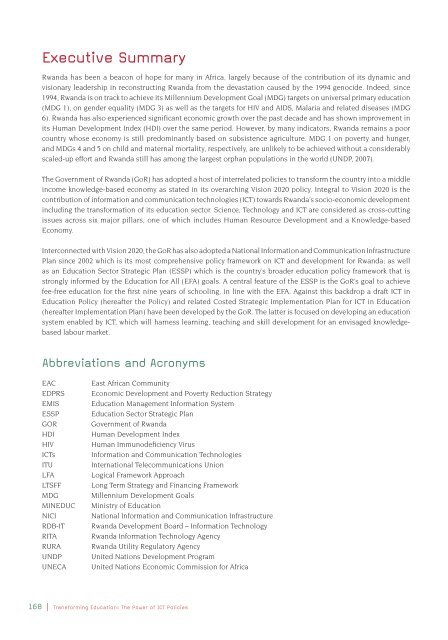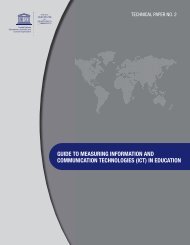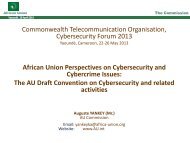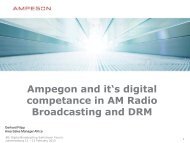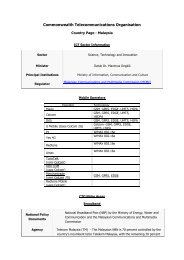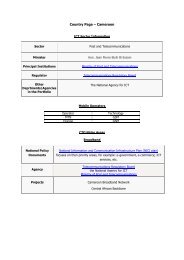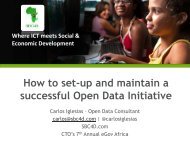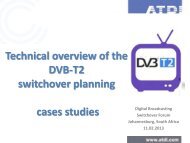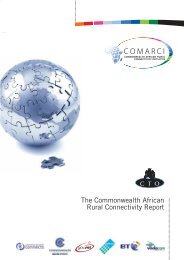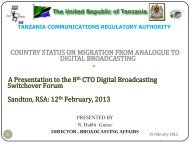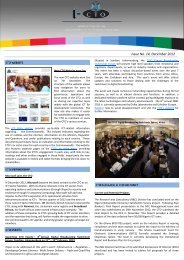Transforming education: the power of ICT policies - Commonwealth ...
Transforming education: the power of ICT policies - Commonwealth ...
Transforming education: the power of ICT policies - Commonwealth ...
Create successful ePaper yourself
Turn your PDF publications into a flip-book with our unique Google optimized e-Paper software.
Executive Summary<br />
Rwanda has been a beacon <strong>of</strong> hope for many in Africa, largely because <strong>of</strong> <strong>the</strong> contribution <strong>of</strong> its dynamic and<br />
visionary leadership in reconstructing Rwanda from <strong>the</strong> devastation caused by <strong>the</strong> 1994 genocide. Indeed, since<br />
1994, Rwanda is on track to achieve its Millennium Development Goal (MDG) targets on universal primary <strong>education</strong><br />
(MDG 1), on gender equality (MDG 3) as well as <strong>the</strong> targets for HIV and AIDS, Malaria and related diseases (MDG<br />
6). Rwanda has also experienced signifi cant economic growth over <strong>the</strong> past decade and has shown improvement in<br />
its Human Development Index (HDI) over <strong>the</strong> same period. However, by many indicators, Rwanda remains a poor<br />
country whose economy is still predominantly based on subsistence agriculture. MDG 1 on poverty and hunger,<br />
and MDGs 4 and 5 on child and maternal mortality, respectively, are unlikely to be achieved without a considerably<br />
scaled-up effort and Rwanda still has among <strong>the</strong> largest orphan populations in <strong>the</strong> world (UNDP, 2007).<br />
The Government <strong>of</strong> Rwanda (GoR) has adopted a host <strong>of</strong> interrelated <strong>policies</strong> to transform <strong>the</strong> country into a middle<br />
income knowledge-based economy as stated in its overarching Vision 2020 policy. Integral to Vision 2020 is <strong>the</strong><br />
contribution <strong>of</strong> information and communication technologies (<strong>ICT</strong>) towards Rwanda’s socio-economic development<br />
including <strong>the</strong> transformation <strong>of</strong> its <strong>education</strong> sector. Science, Technology and <strong>ICT</strong> are considered as cross-cutting<br />
issues across six major pillars, one <strong>of</strong> which includes Human Resource Development and a Knowledge-based<br />
Economy.<br />
Interconnected with Vision 2020, <strong>the</strong> GoR has also adopted a National Information and Communication Infrastructure<br />
Plan since 2002 which is its most comprehensive policy framework on <strong>ICT</strong> and development for Rwanda; as well<br />
as an Education Sector Strategic Plan (ESSP) which is <strong>the</strong> country’s broader <strong>education</strong> policy framework that is<br />
strongly informed by <strong>the</strong> Education for All (EFA) goals. A central feature <strong>of</strong> <strong>the</strong> ESSP is <strong>the</strong> GoR’s goal to achieve<br />
fee-free <strong>education</strong> for <strong>the</strong> fi rst nine years <strong>of</strong> schooling, in line with <strong>the</strong> EFA. Against this backdrop a draft <strong>ICT</strong> in<br />
Education Policy (hereafter <strong>the</strong> Policy) and related Costed Strategic Implementation Plan for <strong>ICT</strong> in Education<br />
(hereafter Implementation Plan) have been developed by <strong>the</strong> GoR. The latter is focused on developing an <strong>education</strong><br />
system enabled by <strong>ICT</strong>, which will harness learning, teaching and skill development for an envisaged knowledgebased<br />
labour market.<br />
Abbreviations and Acronyms<br />
EAC East African Community<br />
EDPRS Economic Development and Poverty Reduction Strategy<br />
EMIS Education Management Information System<br />
ESSP Education Sector Strategic Plan<br />
GOR Government <strong>of</strong> Rwanda<br />
HDI Human Development Index<br />
HIV Human Immunodefi ciency Virus<br />
<strong>ICT</strong>s Information and Communication Technologies<br />
ITU International Telecommunications Union<br />
LFA Logical Framework Approach<br />
LTSFF Long Term Strategy and Financing Framework<br />
MDG Millennium Development Goals<br />
MINEDUC Ministry <strong>of</strong> Education<br />
NICI National Information and Communication Infrastructure<br />
RDB-IT Rwanda Development Board – Information Technology<br />
RITA Rwanda Information Technology Agency<br />
RURA Rwanda Utility Regulatory Agency<br />
UNDP United Nations Development Program<br />
UNECA United Nations Economic Commission for Africa<br />
168 | <strong>Transforming</strong> Education: The Power <strong>of</strong> <strong>ICT</strong> Policies


